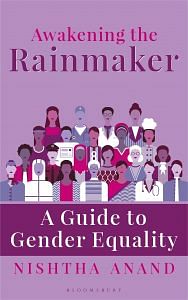Forty-nine per cent managers say choosing a male over an equally meritorious female candidate is better strategy…Fifty-four per cent say women should take a career break when work-life integration turn demanding…Forty-nine per cent say managing teams with women is challenging.’
Bias and scepticism among managers is a key barrier to the success of any gender-inclusion initiative. It is especially important, considering a manager’s role in shaping careers. They hire employees, are responsible for their ongoing work profile, coach them through career development and manage appraisals. While the top leadership may have a vision and the HR department policies in place, there are always unsaid micro-policies that an immediate boss encourages. These may differ from one manager to the next, but they impact hiring and promotions. Given the importance of their roles, people often follow the adage ‘Choose a boss, not a job’. A great boss can help you unlock untapped potential,
while an average boss can demoralise you.
Learning and development
Payal Gupta, director and CEO of the consulting firm Celebratory Network, shared an instance during our discussion which aptly demonstrates how sensitisation through learning and development (L&D) programmes is crucial for managers:
“We consulted with a company where a chairperson, who had called a meeting of all the senior MDs, asked the only woman present in the group to take notes, not acknowledging the fact that she was the business lead of the largest line of business. He just assumed that the woman would take notes. Sensitisation through L&D programmes to stop such behaviour is essential and all managers should go through it.”
While most HR teams focus on sensitisation of managers through training and development
initiatives, it is equally important to ensure real implementation of some of the learnings. One aspect which is criticised by some business heads is that most training sessions tend to be clichéd, irrelevant to their job, with little focus on business. For a more suitable engagement, the HR team must engage with department heads and work together to create business-specific training programmes.
Beyond training in soft skills like empathy and understanding comes the aspect of mentoring and creating leaders, which needs the time and attention of managers. While most managers do take some time out to mentor their juniors, it is limited to a performance discussion and a goal-setting exercise. Having a formal mentoring programme with direct bosses and other group heads can be impactful, if done right. Different organisations do it in different ways. An effective programme would be the practice of sponsorships, which are quite common in the consulting industry. Rightly implemented, sponsorships can prove to be a powerful tool. A mentor (usually not the reporting manager) represents their mentee on important platforms, gives them exposure to their own network, presents their case during appraisals and promotions, and gives real-time feedback on both performance and soft skills. This requires regular commitment on the part of the mentor to see their protégé rise through the levels, not just by giving advice, but by allocating one’s own time and effort to the cause. Some companies promote this system by encouraging networking events that help their employees interact with members of different teams, clients and industry leaders and, in the process, find their respective mentors informally.
Another aspect of L&D is to coach employees in softer skills such as public speaking and critical thinking, and conduct mentoring sessions to provide appropriate career guidance and counselling. Had Kalpana Morparia’s bosses not believed in her capabilities and pushed her to go beyond her comfort zone, she may not have been able to achieve the heights of success she has seen. Like Kalpana, many more women will be able to polish and enhance their skills and move ahead in the corporate world if they find supportive bosses.
Also read: ‘They’re scared of us, we’re not scared of them’ — women workers after Urban Company sues them
Setting objective targets and processes
L&D is important, and several large organisations have ‘Managerial Essentials Training’ for awareness on gender inclusion. However, translating the concept of such awareness into real action is a daunting task. A structured approach, along with setting objective targets and processes across all aspects of a corporate journey, can help overcome the challenge. Broadly, there are three different stages across a corporate journey where women will benefit from having inclusive guidelines and goals in place: recruitment, daily work and performance appraisals.
Men tend to be evaluated on potential, while managers demand proven accomplishments from women. Men are also likely to get more credit for their success compared to women. To add to this joy-ride, women are judged more critically for any failures. This creates an uneven playing field for them.
Women continue to struggle more for promotions at managerial levels and beyond. For every 100 men promoted as managers, only 85 women get promoted. Largely because of this disparity, men end up with 62 per cent of manager-level positions, while women hold
only 38 per cent of such roles.
The ratio only gets worse thereafter. Continue biases at work end up slowing the career graph of women by several crucial years. If we want to close the current, significant gender gap, women need to be evaluated fairly and on an equal footing as men. An objective evaluation system plays the most important role in removing biases during performance appraisals. This was made clear by several industry leaders and HR professionals I met. Setting clear targets is the answer. When employees know the KPIs they are working towards and the level of performance that will take them forward, subjective opinions can be kept at bay. ZestMoney is one company where this system is followed and transparency and consistency are maintained during all evaluations.
Payal Gupta stressed the importance of having an audit of the performance evaluation process by citing advice she gave one of her clients. She said, ‘Managers need to be given formal training in carrying out fair evaluations and giving feedback. Post these trainings, there needs to be a panel that checks how managers are doing reviews—this panel can sit in random selections of appraisals to gauge the effectiveness of manager evaluation training. Additionally, feedback needs to be gathered from subordinates on the quality of the review discussion. They should get a sense that their manager invested time in preparing their feedback, highlighted their strengths and gave specific inputs for areas of improvement. Where the quality of review feedback is consistently poor for any manager, the panel should take corrective steps through rigorous training in helping the manager improve.’
Also read: 51% Indian women will be employable in 2022, compared to 46% men: Annual skills survey
A good boss paves the way for future good bosses
For an inclusive work environment, an organisation needs to train and sensitise its managers in the right way and promote a culture of objectivity across the board. It is the HR team’s responsibility to track diversity-and-inclusion targets for each manager and undertake proactive interventions when they see a dip in performance on these parameters. The company’s assertiveness in holding managers accountable for gender inclusion is a key pillar of how effectively policy is translated into meaningful actions and results.
 This excerpt has been published with permission from Bloomsbury India.
This excerpt has been published with permission from Bloomsbury India.



